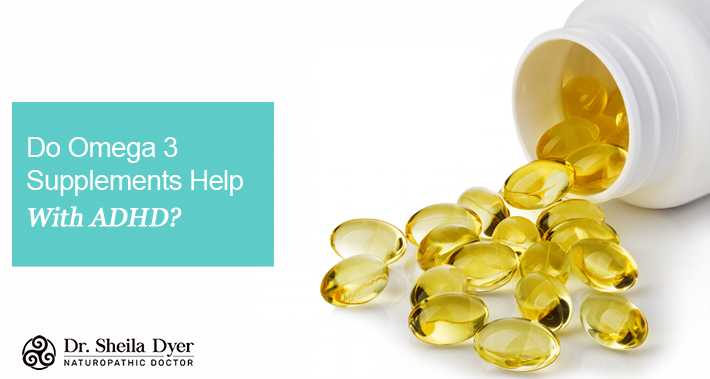If you have difficulty staying focused, it may be that you have ADHD.
And if that’s the case, you may have found people recommending you take omega 3 supplements as a natural way to manage your symptoms.
But does it actually work that way?
To answer that, we first have to talk about what ADHD is and what omega 3 fatty acids are.
Attention deficit hyperactivity disorder, ADHD, is a condition marked by hyperactivity, impulsivity, and lack of focus.
This can cause difficulties in academic, personal, or work performance and in completing tasks.
One of the potential causes of ADHD is dopamine deficiency in the brain.
Omega 3 supplements may help regulate your body’s ability to produce dopamine.
As a naturopathic doctor for ADHD in Toronto, I’m here to help you learn about ADHD and explore natural solutions.
Let’s find out more about what exactly omega 3 is, what it does for your body, and how it can help you.
What Are Omega 3 Fatty Acids?
We’ve talked about fat on this blog before.
Fat is, simply put, any oil that’s usually solid at room temperature.
There are, of course, healthy fats and unhealthy fats.
Omega 3 fatty acids are one of the healthy ones.
They have a variety of different functions in your body, and may also give you several health benefits.
Omega 3s are considered an essential nutrient.
That means, just like the various vitamins and minerals you need, your body can’t make it on its own.
Instead, you have to get them through your diet.
There are many dietary options for omega 3s, such as fatty fish, fish oils, and various types of seeds and nuts.
Types of Omega 3 Fatty Acids
There are three primary types of omega 3s your body needs: ALA, EPA, and DHA.
Let’s take a look at each of them separately.
What Is ALA Omega 3?
ALA, or alpha linolenic acid, is the most commonly found omega 3 in your diet.
It’s mainly used by your body for energy.
ALA predominantly comes from plant based foods like flaxseeds, chia seeds, walnuts, soybeans, and hemp seeds.
What Is EPA Omega 3?
Another type of omega 3 is EPA, or eicosapentaenoic acid.
You can see why we rely on abbreviations for these.
EPA is generally found in animal based products, like fatty fish.
Some microalgae contain it as well, however.
If you’re a vegetarian or vegan, this is the only currently known source of EPA.
It’s what vegan omega 3 supplements are made from.
What Is DHA Omega 3?
Lastly there’s DHA, docosahexaenoic acid.
This is the most essential omega 3 fatty acid because it’s an important structural part of your brain, retina, and other parts of your body.
You can find it in fish oil, fatty fish, meat, fortified eggs, and dairy that comes from grass fed animals.
Like with EPA, you can also take microalgae supplements for DHA if you follow a vegetarian or vegan based diet.
What Are The Benefits Of Omega 3 Fatty Acids?
Now that we’ve discussed what omega 3s are, let’s take a closer look at what they can do for your health.
There are many potential health benefits to having omega 3 fatty acids.
These can range from overall brain and heart health, to reduced inflammation, eye health, and benefit some chronic conditions.
May Help Depression And Anxiety
Depressive disorder is a common mental disorder that is characterized by sadness, disinterest in life, and inactivity.
An anxiety disorder, on the other hand, may include feelings of panic, fear, difficulty coping with stress, or a sense of “impending doom.”
RELATED: Botanical Medicine Solutions To Soothe Your Anxiety
Omega 3s may help reduce the risk of developing these mental disorders.
They do this by increasing production of a neurotransmitter called BDNF –brain derived neurotrophic factor.
This promotes neuroplasticity, among other things.
Increasing your intake of omega 3s may also help reduce symptoms if these conditions are preexisting.
Could Benefit Eye Health
Omega 3s may help keep your eyes healthy.
DHA, a specific type of omega 3, is an important structural part of your retina.
Having adequate omega 3s in your diet can keep your retina healthy and reduce the risk of macular degeneration.
May Reduce Risk Factors For Heart Disease
Omega 3’s may help in reducing the risk factors associated with heart disease and strokes.
There are several benefits of having omega 3s in relation to heart health.
Omega 3s can help prevent blood clots from forming by keeping blood platelets from clumping together.
They can also potentially raise HDL cholesterol levels and lower LDL cholesterol levels, which can regulate your body’s good cholesterol levels.
RELATED: Everything You Always Wanted To Know About Cholesterol
Can Help Reduce Inflammation
Inflammation that persists over a long period of time, or chronic inflammation, can have negative effects on your body.
It can contribute to many chronic conditions, such as:
- Rheumatoid arthritis
- Ulcerative colitis
- Crohn’s disease
- Carpal tunnel syndrome
- Psoriasis
- Eczema
- SIBO
- Fibromyalgia
- And many others
Omega 3 fatty acids can reduce and regulate the production of inflammatory substances and molecules in your body.
Omega 3 supplementation may be beneficial in reducing inflammation and as a result help with other chronic conditions.
May Be Good For Bone And Joint Health
Omega 3 fatty acids may be beneficial in improving your bone strength by increasing the amount of calcium in them.
This may reduce your risk of osteoporosis.
They may also be used to aid in the treatment of certain types of arthritis, and can help reduce pain in the synovial joints.
Can Improve Sleep Quality
It’s important to get enough sleep to maintain good health.
But while most people know that diet and exercise are important parts of your health, they’re not the full picture.
That’s why we’ve talked about sleep so much on this blog before – the effects of sleep deprivation, the potential medical causes of insomnia, bedtime snacks to help you sleep, and some sleep advice for shift workers like nurses.
We’ve even got an entire article on how to optimize your sleep.
And there’s a good reason for all of that.
Being deprived of sleep can lead to conditions like obesity, depression, type 2diabetes, and much more.
It can also impact your ability to focus, which is already a problem if you have ADHD.
And you guessed it, having low levels of omega 3 fatty acids can impact your sleep quality.
Do Omega 3 Fatty Acids Help With ADHD?
The answer to this isn’t a simple yes or no.
In some cases, omega 3 deficiency can lead to similar symptoms as ADHD.
This includes difficulty concentrating, poor memory, inattentiveness, and, in kids, behavioural problems.
That isn’t the same as having ADHD, of course.
But if you’re deficient in omega 3s and also have ADHD, these effects can compound.
There’s more to it than that, though.
We’re not exactly sure yet what the primary cause of ADHD is, but we know it’s a difference in neurodevelopment.
People with ADHD have a defective DRD2 gene.
This makes it difficult for your brain to respond to your body’s neurotransmitters, dopamine in particular.
RELATED: The Link Between Fibromyalgia And Your Neurotransmitters
We know that dopamine plays a role in depression, so the fact that ADHD and depression are linked shouldn’t come as a surprise.
Omega 3 oils seem to reduce inflammatory markers in your brain, which may help improve your neurotransmitter function.
So in this regard, omega 3 oils can help with ADHD.
But this only seems to be the case if you’re actually deficient in omega 3s.
If you’re getting enough omega 3 in your diet, you’re probably okay.
Does high dose omega 3 supplementation help with ADHD?
Currently, the results are mixed.
Overall, omega 3 supplements are considered safe and well tolerated, but it’s best to speak with your naturopathic doctor first to be safe.
Dietary Sources Of Omega 3 Fatty Acids
There are many foods to choose from that have omega 3 fatty acids.
Eating fatty fish twice a week can provide you with an adequate amount of omega 3s for your body’s function.
Fish that are high in omega 3s include:
- Mackerel
- Salmon
- Herring
- Sardines
- Anchovies
Caviar and shellfish, such as oysters, are also packed with nutrients and are a rich source of omega 3 fatty acids.
You can also take cod liver oil, which is extracted from cod fish and taken as an omega 3 supplement.
Aside from omega 3s, cod liver oil is also packed with vitamin A and vitamin D.
Plant based sources of omega 3 fatty acids include:
- Flaxseed or flaxseed oil
- Chia seeds
- Walnuts
- Soybeans
- Hemp seeds
- Spinach
- Brussels sprouts
You can also get a decent amount of omega 3s from grass fed meats and dairy, pasteurized eggs, and omega 3 enriched eggs.
Find what fits your diet and include omega 3 rich foods to get an adequate amount to benefit your overall health.
Book Your Appointment With Dr. Sheila Dyer, ND, Today
If you or your child have been diagnosed with ADHD and are looking for natural ways to manage your symptoms, I’m here to help.
We can work together to explore natural solutions to manage your ADHD diagnosis.
Book your appointment with me, Dr. Sheila Dyer, ND, today.
If you have questions about naturopathic medicine, or would like to start with your first consultation, contact me, and let’s book an appointment.
Dr. Sheila Dyer, ND1080 Dovercourt Rd,
Toronto, ON M6H 2X8
(416) 554-5135
► https://g.page/DrSheilaDyerNd
Dr. Sheila Dyer is a Naturopathic Doctor and a practicing registered nurse offering holistic healthcare with a scientific focus

